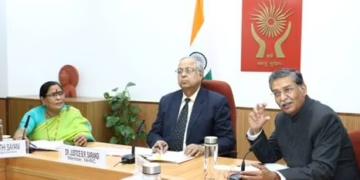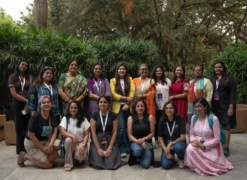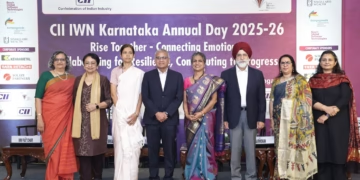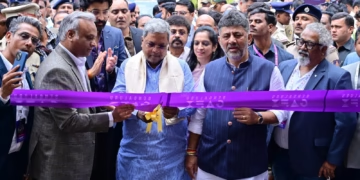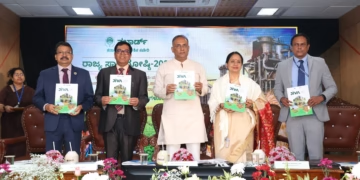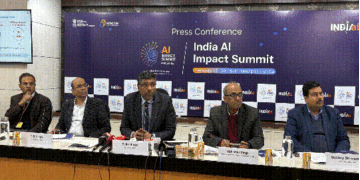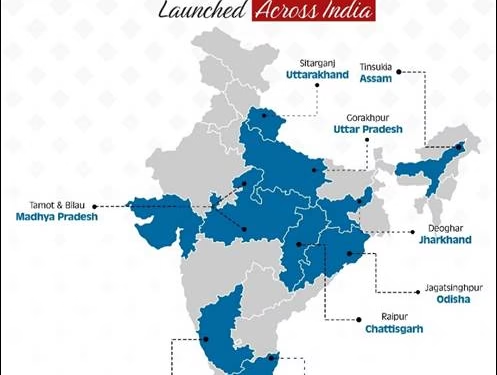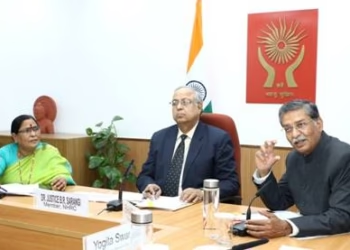Accelerating Growth of the Polymer-Based Industrial Ecosystem
Introduction
The Department of Chemicals and Petro-Chemicals is implementing the Scheme for Setting up of Plastic Parks under the umbrella scheme of New Scheme of Petrochemicals, to support setting up need-based Plastic Parks, with requisite state-of-the-art infrastructure, enabling common facilities through cluster development approach, to consolidate the capacities of the domestic downstream plastic processing industry. The objective is to consolidate and synergize the capacities of downstream plastic processing industry to help increase investment, production and export in the sector as well as generate employment. Under the scheme, the government of India provides grant funding up to 50% of the project cost subject to a ceiling of Rs.40 crore per project.
A plastic park is an industrial zone specifically designed for plastic-related businesses and industries. It aims to consolidate and synergize the capacities of the plastic processing industry, promoting investment, production, and exports while generating employment. These parks also focus on achieving environmentally sustainable growth through waste management and recycling initiatives.
Plastic Parks have emerged as an integral part of India’s strategy for managing plastic waste, promoting recycling, and supporting the chemical industry. 10 Plastic Parks have been approved so far in different States. Details of funds released to these Plastic Parks during the last five years are:
| Plastic Park Location | Approval Year | Total Project Cost
(₹ crore) | Approved Grant-in-aid
(₹ crore) |
Amount Released
(₹ crore) |
| Tamot, Madhya Pradesh | 2013 | 108.00 | 40.00 | 36.00 |
| Jagatsinghpur, Odisha | 2013 | 106.78 | 40.00 | 36.00 |
| Tinsukia, Assam | 2014 | 93.65 | 40.00 | 35.73 |
| Bilaua, Madhya Pradesh | 2018 | 68.72 | 34.36 | 30.92 |
| Deoghar, Jharkhand | 2018 | 67.33 | 33.67 | 30.30 |
| Tiruvallur, Tamil Nadu | 2019 | 216.92 | 40.00 | 22.00 |
| Sitarganj, Uttarakhand | 2020 | 67.73 | 33.93 | 30.51 |
| Raipur, Chhattisgarh | 2021 | 42.09 | 21.04 | 11.57 |
| Ganjimutt, Karnataka | 2022 | 62.77 | 31.38 | 6.28 |
| Gorakhpur, Uttar Pradesh | 2022 | 69.58 | 34.79 | 19.13 |
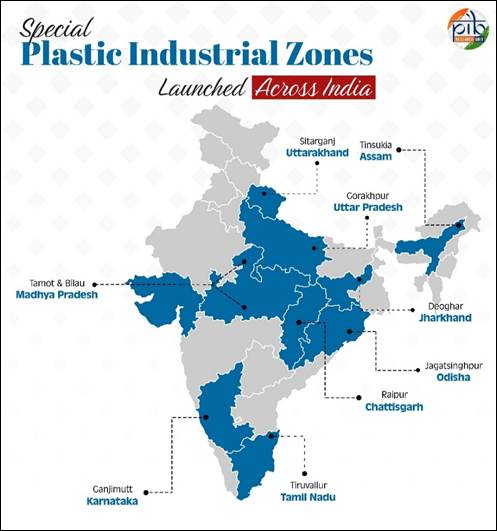
Background and Objectives
India stands 12th in the world export of plastics, as per the 2022 World Bank estimates. It has grown exponentially from 2014, when it was worth just 8.2 million thousand USD, as compared to the 2022 estimates, where it reached 27 million thousand USD. This growth has been a result of the constant efforts by the Indian government to promote the production and export of plastics, like setting up Plastic Parks.
The Indian plastics industry was large but highly fragmented with dominance of tiny, small and medium units and thus lacks the capacity to tap this opportunity. The Department of Chemicals & Petrochemicals formulated this scheme with a view to synergize and consolidate the capacities through cluster development and enhance India’s plastic production and export capabilities. The scheme has the following objectives:
- Increase the competitiveness, polymer absorption capacity and value addition in the domestic downstream plastic processing industry through adaptation of modern, research and development led measurers.
- Increase investments in the sector through additions in capacity and production, creating quality infrastructure and other facilitation to ensure value addition and increase in exports.
- Achieve environmentally sustainable growth through innovative methods of waste management, recycling, etc.
- Adopt a cluster development approach to achieve the above objectives owing to its benefits arising due to optimization of resources and economies of scale.
Process of setting up a Plastic Park
For the purpose of setting up Plastic Parks, the Department of Chemicals and Petrochemicals seeks preliminary proposals from state governments, highlighting the proposed location, financial details, broad cost estimates etc. Following in-principle approval from the Scheme Steering Committee, the State implementing agency is required to submit a Detailed Project Report (DPR) to the Department, which is evaluated and final approval is given by the Scheme Steering Committee based on the viability of the proposed project.
For example, in November, 2020, the Department invited proposals from the state governments for establishing two new Plastic Parks. Proposals were received from the state governments of Bihar, Uttar Pradesh (02 proposals), Karnataka and Himachal Pradesh. These were examined by an Expert Committee, based on which the setting up of Plastic Parks at Gorakhpur, Uttar Pradesh, and at Ganjimutt, Karnataka, was approved in July, 2022 and January, 2022 respectively.
The Government provides grants-in-aid for the establishment of the Plastic Parks. The implementation of these projects as well as the process of getting them populated by industrial units is largely in the hands of the Special Purpose Vehicles set up by the State Government or State Industrial Development Corporation or their agencies. The respective States have taken several steps to promote private sector participation in these Plastic Parks, including conducting awareness and sensitization programmes for the industry, providing plots at competitive rates, giving tax incentives etc.
Under the Scheme, common infrastructure for the sustainability and eco-friendliness of industrial units is provided including effluent treatment plant, solid/ hazardous waste management, facilities for plastic recycling, incinerator etc. Some of the Plastic Parks have also established in-house recycling sheds for recycling of plastic waste.
Other Government Initiatives for promoting Plastic Production in India
The other initiatives taken by the Government to enhance plastics processing are:
- Centres of Excellence (CoE): To promote the research and development in polymer and plastics the department has established 13 Centres of Excellence in various national level institutes.
| Location of the Centre of Excellence (CoE) | Title of Centre of Excellence | Date of Approval |
| National Chemical Laboratory, Pune | Sustainable Polymer Industry to Research & Innovation | 15.04.2011 |
| Central Institute of Plastic Engineering & Technology (CIPET), Chennai | Green Transport Network (GREET) | 01.04.2011 |
| CIPET, Bhubaneswar | Sustainable Green Materials | 06.04.2013 |
| Indian Institute of Technology (IIT), Delhi | Advanced Polymeric Materials | 15.03.2013 |
| IIT, Guwahati | Sustainable Polymers (Sus-Pol) | April 2013 |
| IIT, Roorkee | Process Development, Wastewater Management in Petrochemical Industries | 12.02.2019 |
| CIPET, Bhubaneswar | Bio-engineered Sustainable Polymeric Systems | 12.02.2019 |
| National Chemical Laboratory, Pune | Specialty Polymers for Customized Applications | 12.02.2019 |
| CSIR – North East Institute of Science & Technology (CSIR-NEIST) | Polymers, Their Composites and Polymeric Membranes for Sustainable Development of Petroleum Industries | 04.12.2020 |
| CSIR-IICT, Hyderabad | Polymer Coatings for Decorative, Protective and Strategic Applications | 04.12.2020 |
| CIPET, Bhubaneswar | Manufacturing of Next Generation Bio-Medical Devices | 04.12.2020 |
| IIT, Guwahati | Sustainable & Innovative Design and Manufacturing of Polymer-based Products | February 2022 |
| IRMRA, Thane | Design and Development for Value added Toys of Rubber and Allied Finished Products | February 2022 |
These CoEs focus on various aspects such as sustainable polymers, advanced polymeric materials, bio-engineered systems, and process development for wastewater management in petrochemical industries. They aim to drive innovation, improve technology, and promote environmentally sustainable development within the sector.
- Skilling of Workforce: Central Institute of Petrochemical Engineering and Technology is conducting many short term and long-term courses in Plastics processing and Technology to cater to the skilling requirement of the industry.
Indian Plastic Industry and Environment Sustainability
The Government of India has taken several steps to ensure that the development of the plastic industry is environmentally sustainable and aligned with global sustainability standards.
- The Extended Producer Responsibility (EPR) Regulations for plastic packaging mandate targets for minimum level of reuse, recycling and use of recycled content. This ensures accountability for waste collection, recycling, and reuse. Certain single-use plastics have been banned, with a focus on reducing plastic waste. The regulations also mandate to utilize minimum amount of recycled material in packaging products.
- The Hazardous Waste Management Rules seek to ensure proper disposal of hazardous chemicals and promote waste minimization and resource recovery.
- The Government promotes the adoption of circular economy principles in the plastic industry, including recycling and the use of biodegradable alternatives. In order to promote the latest technologies and products for circular economy, the Department supports and encourages industry in organizing discussions and exhibitions to showcase the latest technologies and machinery for waste management, recycling and up-cycling as well as the innovative products made from recycled material.
- India engages with international organizations such as the World Trade Organization (WTO) and the United Nations Environment Programme (UNEP) to enable compliance with global sustainability standards. Further, India actively participates in meetings of the International Organization for Standardization (ISO) which formulates international standards for plastic products.
Conclusion
The Plastic Parks scheme, under the Department of Chemicals and Petrochemicals, represents a comprehensive and forward-looking initiative that addresses both the industrial growth and environmental sustainability of the Indian plastics sector. By providing state-of-the-art infrastructure, fostering cluster-based development, and encouraging private sector participation, the scheme not only strengthens India’s downstream plastic processing capabilities but also attracts investment, boosts exports, and generates employment. As India continues to rise in global plastic trade rankings, the Plastic Parks scheme and allied measures will remain crucial to ensuring that this growth is sustainable, inclusive, and innovation-driven.






